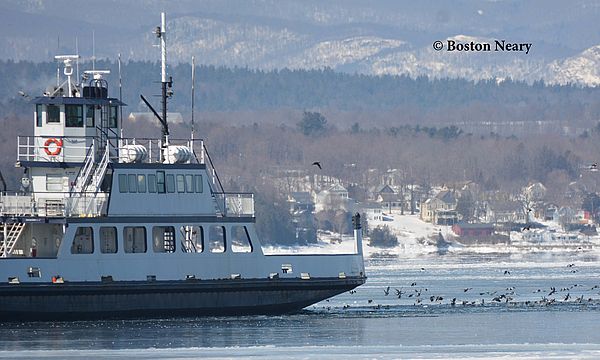After the lake freeze, the few pockets of open water on Lake Champlain became magnets for the winter ducks, gulls, and eagles that stuck around and braved the frigid temperatures. Hundreds of birds can be found clustered in the ferry lanes dabbling, diving and squawking.
If we spent as much time in the icy water as the ducks we would die of hypothermia, but ducks have a variety of strategies for keeping warm. They fluff their feathers to trap pockets of warm air. They tuck their bills into their bodies reducing the surface area over which heat can be lost. They build up fat reserves during the summer which they burn off during the winter. And they lose very little heat through their legs. Blood vessels in the ducks' legs travel in opposite directions and set up a counter current. Warm blood moving out of the body into the legs encounters cool blood traveling up from the feet. Heat is exchanged from one set of blood vessels to the other throughout the period of their contact. This process conserves most of their body heat rather than losing it to the atmosphere. The system is so efficient that a duck will actually lose more heat from feathered parts of its body than from its exposed feet and legs.
As the days grow longer the intensity of the sun increases so the ice will start melting, attracting even more birds. Many migrating species have already returned: turkey vultures, killdeer, red-winged blackbirds, and surely you’ve noticed the hordes of robins scratching at every piece of bare ground. With most species the males return before the females so they can establish and defend a nesting ground. Once the females return the singing begins as each male tries to convince a female he has found the perfect spot to raise a brood of chicks.
For those interested in avian encounters along the lake, LCC will be hosting bird walks again this year each Friday in May. Walks will begin at Oakledge Park in Burlington at 8:00 AM and last about an hour. Check out LCC's calendar of events for postings about each bird walk.
